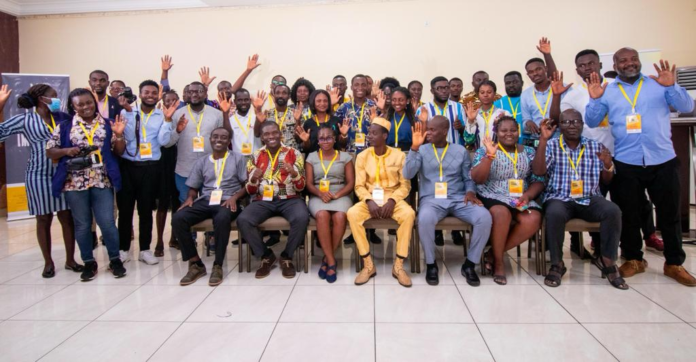Some selected journalists in Ghana have benefited from a one-day training workshop on play-based learning and its impact in Ghanaian classrooms.
The primary objective of the workshop organised by Right To Play Ghana was to equip media practitioners and public relations officers of the Ghana Education Service (GES) and the Ministry of Education (MoE) with the requisite knowledge to cover and report on play-based learning in the country.
Another focus of the training was to provide Ghanaian journalists with data on how the incorporation of play-based learning by some teachers in the Northern, Volta and Greater Accra regions, is positively impacting the learning outcome of Ghanaian girls and boys.
Explaining the rationale behind the workshop held in Accra on Friday, October 21, 2022, the Communications Specialist at Right To Play Ghana, A. Kwabena Brako said the mass incorporation of play-based learning across Ghana would require the services of journalists who will serve as play advocates.

“The misconceptions around the use of play in the classroom are many and this requires a direct response backed by relevant scientific data. However, we are aware that individual journalists cannot shift the tide of education coverage alone, particularly around the impact of play-based learning in Ghanaian classrooms,” he said.
According to Mr Brako, Right To Play Ghana believes that one of the surest ways to help is to create a “non-profit database of journalists who are willing and able to talk and write about play-based learning and its contribution to quality primary education.”
Speaking after the training, a reporter with Kingdom FM in Accra, Samuel Opoku, described the program as a success and pledged to use his newly found knowledge to educate Ghanaians about the importance of play in Ghana’s education.

“It was a rather interesting and informative training session and I can confidently say that I am better informed about the play-based learning methodology and its benefits than I was before. This, I am convinced, will help me to better communicate this message to Ghanaians,” he said.
For the public relations officer of the Weija-Gbawe Municipal Education Directorate, Millicent Makafui Aweke, even though she had heard about Right To Play Ghana and its works, she had scant information about the play-based learning pedagogy as an effective teaching and learning tool.
“I know about Right To Play and have seen the impact you have brought to Ghana’s education from experience, but I got a clearer understanding of how teachers are to use play to teach and when I get an opportunity to speak, I now know what to say and how exactly to say it,” she said.
She added that “for [the] government to be convinced to scale-up play-based learning across the country, I think we the beneficiaries have a role to play.”
In all, a total of 39 journalists and six PROs of GES and MoE from the Greater Accra and Volta regions, participated in the workshop on the play-based learning pedagogy.

